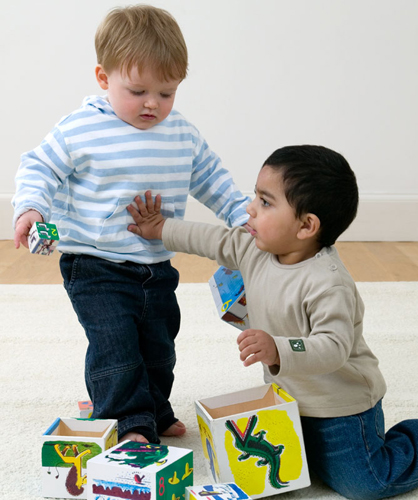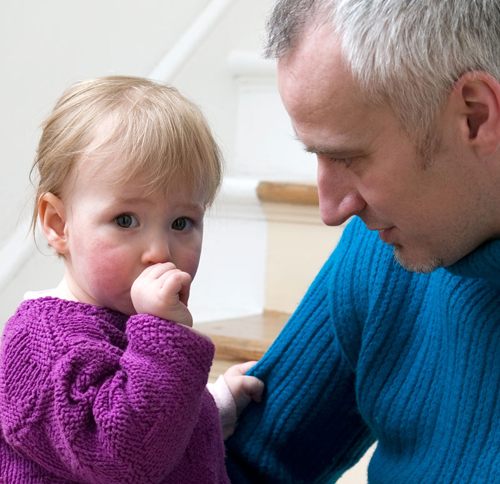At this age, your toddler is not being deliberately
naughty and does not know how to manipulate. He is simply
attention-seeking and exploring, with no capacity for common sense and
little memory or reasoning ability. He simply can’t understand the world
from someone else’s perspective.
“The phrase that I
repeat to parents constantly is ‘Praise the good and ignore the bad.’
The earlier you can begin, the easier it will be for you and your
child.”
“I still find it hard to
cope when Liam screams and cries. I feel so helpless. We talk to him
softly, which seems to calm him down.”
—“I still find it hard to
cope when Liam screams and cries. I feel so helpless. We talk to him
softly, which seems to calm him down.”
“Remember to say ‘No’ to the behavior, rather than criticizing your child.”
All children have the right
to be respected for who they are and for their views, but not at the
expense of those around them, or society as a whole. Section one
explains the true nature of child-centered parenting and the need for a careful balance between parental warmth and control .
This section is called “managing behavior” rather than “disciplining
your child” for a reason. For your child to learn to manage his feelings
appropriately and develop good social skills, he needs you to set
behavior boundaries. Behaving well is the result of good behavior
habits, a routine, and plenty of praise, rather than enforced obedience.
The dilemma is that we want
our children to understand that when we say “No” we mean it, but we
also want them to have the knowledge and strength of character to be
able to refuse if an adult or child tries to coerce them into doing
something they don’t want to. By learning boundaries from you when he is
young, your child can begin to develop self-control, which is the key
to both self-esteem and personal safety.
Playtime battles
Conflict between toddlers sharing a toy is normal. Distracting one
or both children with another activity is a more effective tactic than
“telling them off,” not least because they’re not being purposefully
naughty.

Your toddler’s response
At 12–18 months your toddler is still too young to have much control over his personal response as the frontal lobes of the brain
are still developing. So the onus at this age is very much on you, the
parent, to help your child control his behavior. He will experience very
strong feelings at this age, which may overwhelm and scare him, but
there is a host of strategies available that will keep the mutual stress
to a minimum and encourage your toddler to get used to these new
feelings.
Small children cry
because they are distressed, not because they are being manipulative. It
may be because they want something, need something, are frightened, or
are ill. It is important to make sure that there are no signs of fear or
sickness. Sometimes the problem can be as simple as tiredness or the
need for a diaper change.
Toddlers can be surprisingly
determined, so if your child wants something specific, you may be in for
a long haul unless you can figure out quickly what is needed. In these
instances, distraction is probably the best option.
Reassurance
If she is distressed, your child will usually be pacified by your
presence and the pleasure of your attention. The reward of a smile and a
hug often restores order.

Distraction techniques
Reasoning with your child
at this age just will not work—he does not have the language or
reasoning abilities to follow your logic. The same is true of asking him
to wait. If he needs distracting, you may have to physically move him
somewhere else, and offer something to occupy him, rather than get
locked into a battle of wills and mounting frustration.
If you are away from
home and foresee a problem, it is helpful to be prepared in advance.
Make sure you take a couple of toys or books with you and, if necessary,
ask another adult to come along and help you. The toys can be used as a
distraction in case of upset or, even better, used as a reward for good
behavior or as entertainment to avoid any difficulties. A screaming
toddler will have less impact on the rest of the adult world if he is
outside, so don’t be afraid to remove your child from an indoor
environment and let him exercise his lungs in healthy fresh air. If you
have older children, you may find that they are more adept than you are
at diverting your toddler.
Sending messages to the brain
There is a growing
body of research that shows that our ability to regulate the impact of
stress develops in the first three years. The messages sent to the brain
in early toddlerhood can affect the way the brain becomes wired and so
influence how we respond to situations as we become older.
It is never a good idea
to allow a child to become out of control and consumed by distress,
particularly at such a young age. When we experience intense feelings,
either of joy or sadness, the body sends chemical messages to the brain.
These messages either take the form of feel-good hormones (opioids and
oxytocin) or stress-fighting hormones (cortisol, adrenaline, and
noradrenaline), and the level and frequency of these at a very young age
will have an impact on how the brain develops, and how your child will
grow up to deal with challenges in later life.
Minimizing stress
A child who experiences
a great deal of shouting, anger, or other kinds of stress during baby
and toddlerhood, will produce permanently high levels of stress-fighting
hormones, especially the chemical cortisol, which is released by the
adrenal glands. A constantly high level of cortisol can be overwhelming
because the body is left in a high state of tension, and set for “fight
or flight” from whatever is causing stress. Adults who have had a highly
stressful childhood will continue to produce high levels of cortisol
quite easily, and will find it hard to react appropriately to
high-pressure situations. It is as if the body is in a constant state of
alert, always looking for threats. This can lead to anxiety. Ultimately the body and mind cannot cope with this state of high alert and become exhausted.
Physical
intervention, shouting, and other violent techniques do not work between
adults and will certainly not work on a defenseless child. We know much
more now than we did a generation ago about how corporal punishment and
other forms of aggression impact the brain and it is now clear that
hitting, shouting, or neglect are very likely to cause damage to a young
child’s development. The child’s physical response will also lead to an
increase in cortisol production. A child who is brought up in an
environment of chronic tension or anger is likely to develop an easily
aroused sense of dread about life in general, and will find it harder as
an adult to find comfort in physical warmth, kindness, or affection.
This, in turn, can impact on the attachment between parent and child
(see The Bond between you and your child. There are negative effects on
learning, too, because when the brain is in a state of high alert or
stress, a child will be unable to learn and develop other skills.
A natural sense of well-being
Feel-good hormones
are the chemicals that help us to deal well with times of distress,
pain, and stress. A child who is confident that he is safe, who has
plenty of fun and affection, and who is comforted when distressed, will
produce more opioids than cortisol. These hormones are natural pain
relievers and give us a sense of well-being. They are produced by the
hypothalamus from deep within the instinctive “lower” brain. Oxytocin is
released and triggers a series of chemical responses that reduce the
negative effects of stress on the body and help us to enjoy life, to go
with the flow, and to question and explore the world we live in.
Your feelings
When handling difficult
behavior, your mood is important because when you are stressed your
toddler may become anxious. This will lead him to want more attention
and be more clingy. You can only teach your child to manage his feelings
if you can regulate your own feelings, such as sadness, anger,
frustration, or hurt. Regulating feelings doesn’t mean ignoring them,
burying them, or not reacting. It means recognizing the feeling you are
having and managing it in such a way that it does not overwhelm you.
Parents start to model
self-regulation when they respond in different ways to a child’s
emotional needs. For example, if a child is screaming in frustration
your reaction will be completely different to your response when he is
screaming from hurt. Parents naturally pick up on the smallest of cues
and respond accordingly. This kind of sensitivity and flexibility is
difficult, however, if you are frequently overwhelmed by your own
feelings—because your toddler will pick up on your distress and you may
model ways of not managing instead. If you are unable to regulate your
feelings, you may be driven to act impulsively, and perhaps
inappropriately, or unable to respond at all. If you find it hard to
cope, do seek help.
Getting it right
There will be challenging
times during early toddlerhood, but if you get the parenting right now,
your child will be much less of a handful when he is a teenager. The
easiest way to navigate these years is to ensure your home is fully
toddler-proofed and to swap the dread of frequent humiliation in public
for a good sense of humor and some advance plans and tactics. Your
armory will need to be stronger with an older toddler, and variations on
strategies will be explained in subsequent sections.
Positive ways to manage behavior
Using positive tactics
to deal with your child’s behavior will encourage a feel-good response
in his brain and build resistance to stress in the future. The core
message behind these tactics is to love your child unconditionally and
to make sure you focus on modifying his behavior rather than
criticizing. For example, saying, “Harry, thank you for using your
words” or “Harry, we are going to do something exciting now” will be
more effective and nurturing than saying, “Harry, how many times do I
have to tell you? You’re a very naughty boy.”
Your child’s
self-esteem is very vulnerable to damage. Being constantly criticized
and shouted at can have a negative effect on his sense of self, and
self-criticism may become a part of his identity.
It is very hard to change
who you are, but we each have the power to change a pattern of
behavior. As your child gets older he will learn that he has control
over his behavior and people’s reaction to it.
Positive tactics for this age group:
Staying calm.
Using love and comfort.
Finding child-friendly areas forsafe play.
Using distraction techniques.
Ignoring bad behavior.
Praising good behavior.
Keep instructions simple.
Using short-term time out techniques
Routine, routine, routine.
A consistent approach.
Rest, food, and sleep.
Lots of play outdoors.
Sibling influence.
Treats and incentives.
Forgiveness.
Patience, tolerance, and humor.
Tactics to avoid at all costs:
Hitting and any form of physical punishment.
Shouting, neglecting, or extreme disapproval.
In-depth explanations.
Too much choice.
Extreme threats.
Delayed punishment.
Shaking or rough handling.
Deprivation or withholding of comfort.
Isolation and rejection.